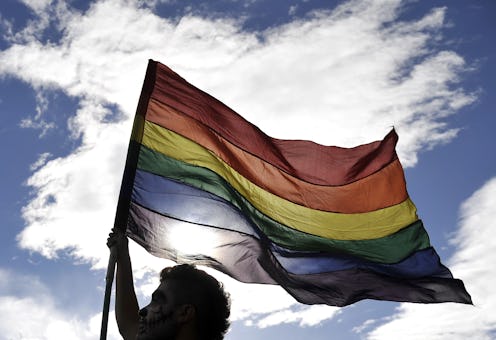Books
The Book World's Mixed Feelings On NC Boycotts
Following the passage of North Carolina's anti-LGBT bill HB-2, many people have spoken out against the law, including independent bookstores in the state. So far, 32 bookstores in North Carolina have signed a petition calling for a repeal of the law, and many more in the books world, from authors to publishers, have come out against the law, too. However, people are somewhat less united on how best to oppose the law.
North Carolina's HB-2 is essentially a pro-discrimination law; it makes laws outlawing discrimination against LGBT people illegal, effectively wiping such laws in many North Carolina cities off the books and making discrimination legal within the state. Numerous large companies and corporations have publicly opposed the North Carolina law, and some have even ceased doing business within the state. But it's not just big companies taking a stand; numerous small bookstores within the state also oppose HB-2 as well.
So far, 32 bookstores in the state have signed an open letter asking the state's lawmakers to repeal the law, and North Carolina-based publishers, including Algonquin Books, have also signed on.
“As the owners and managers of independent bookstores, part of our mission is to provide that ‘third place,’ an additional public space other than home or work where folks can gather to discuss issues important to our community,” they write in a letter. “As independent bookstores providing that third place in communities across our state, we believe it is essential to be non-discriminatory, inclusive and tolerant, to promote freedom of speech and equality, and to guard against censorship and unfair treatment.”
And they aren't the only people in the books world taking a firm stand on the issue. Over 200 children's book authors signed their own open letter against HB-2, and many authors have also spoken out personally, including authors from North Carolina.
And in fact author Sherman Alexie recently announced that he would be skipping stops in North Carolina while on tour in protest.
Others, however, question whether this is an effective strategy. After all, there is a difference between a company like PayPal deciding not to open offices in North Carolina because they don't want to operate in a place where discrimination is legally protected (even apart from the optics, it's not good for employees), and an author refusing to engage with people in the state. As the small businesses point out in their letter, bookstores can be an important force in changing hearts and minds and shaping culture — but that doesn't work so well if you aren't able to bring people together to have that exchange of ideas.
Plus, is it fair to punish small, independent bookstores, who benefit especially from visits from big name authors like Alexie, who themselves do not support the law?
The American Booksellers Association in conjunction with the American Library Association, and several other groups, also oppose boycotting bookstores in North Carolina, saying in a statement, “We urge all authors and illustrators as well as their publishers not to boycott North Carolina bookstores. ... Many independent booksellers opposed HB2 in the legislature and are actively seeking its repeal. In addition, they have a long history of fighting efforts to censor books with LGBTQ themes.”
And indeed, many authors have chosen not to cancel events in the state.
But the question still remains — could visiting the state still be seen as a sign of support? Could boycotts, especially by famous authors, be a more effective way of raising awareness and pushing for change? Or is direct engagement the way to go?
Ultimately, that's a question individual authors must answer for themselves.
Whatever individual authors decide, however, it's comforting to know that the entire books world does seem to be opposed to this law. There have been no reports of individual North Carolina bookshops publicly supporting the law, and overall, publishers, authors, and booksellers all seem united in their opposition, if divided on the best methods. But still, the fact that this community is so universally opposed to discrimination is enough to give you the warm fuzzies.
